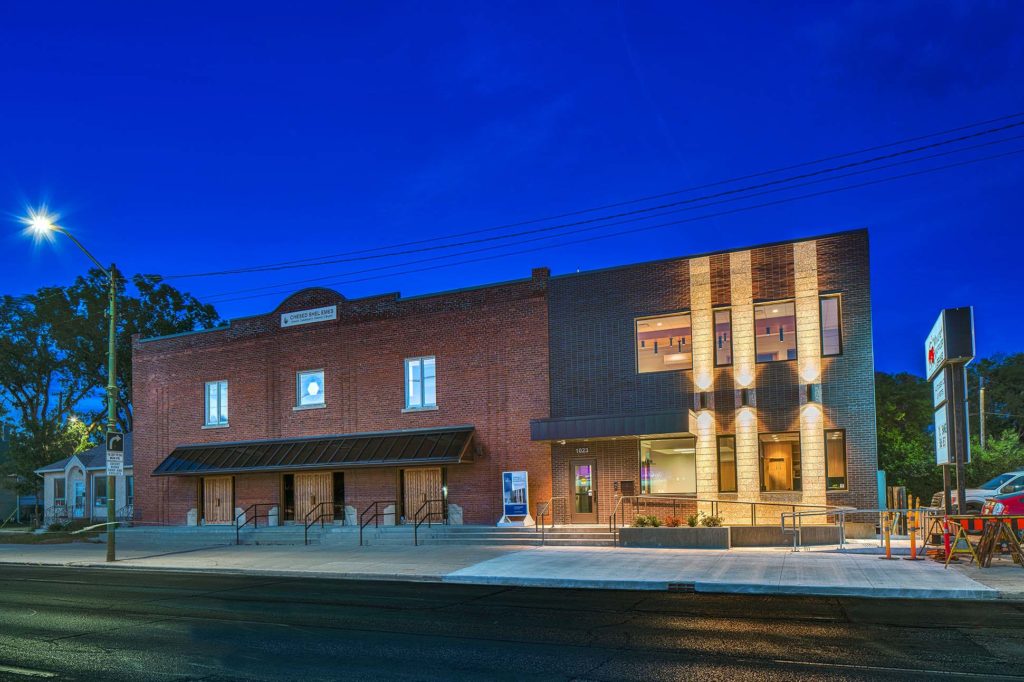Local News
“Rainy River Girl” new account of growing up Jewish in non-Jewish environment

By MYRON LOVE In the first half of the last century, virtually every town and village in North America was home to at least one (and often several) Jewish families – be it the general store owner – or doctor – or, in the case of Toby Gershfield, the dentist.
In her memoir, “Rainy River Girl”, co-written by Gershfield and her, son, James, the daughter of the late Dr. Nathan and Sophie Helman (and granddaughter of the esteemed Rabbi Israel Kahanovitch – western Canada’s foremost rabbi in the interwar years and beyond) recounts her early life in Rainy River, Ontario – a small community about a two hour drive southeast of Winnipeg in the Lake of the Woods area.
For those of us of a certain age – myself included – “Rainy River Girl” brings back memories of growing up Jewish in rural communities where there were few if any other Jewish families. My father’s family, the Kanees, were most closely identified with Melville, Saskatchewan. MY grandparents also operated businesses in several other Saskatchewan communities and I spent my early years in the small town of Shoal Lake in Western Manitoba. We moved into Winnipeg in the mid-1950s just before I turned seven.
In “Rainy River Girl”, Toby Gershfield – who recently turned 91, begins by outlining her family’s origins in Poland and Lithuania, how her parents met, and their decision that her father should become a dentist. She further writes about the history of Rainy River. Then she proceeds to paint vivid pictures of the town and its people in the 1930s, her father’s dental office, the family home, her mother trying to encourage her to learn to play a musical instrument (piano), her father teaching her some Hebrew, her early schooling, and the challenges of a Jewish family trying to keep kosher and follow the traditions in such an alien environment.
She also has a chapter of anecdotes stemming from living with her illustrious zaida. In 19040, when she was 7, her parents sent her to Winnipeg for a year to get some proper Jewish schooling (at the Talmud Torah).
Finally, she writes about the family moving back to Winnipeg , her father enlisting in the Canadian dental corps in 1942 and going off to war in Europe, and his dental practice back in Winnipeg postwar.
“Rainy River Girl” is published by Scribal Scion Publishers, the publishing company that James Gershfield founded in Teaneck, new Jersey, just two years ago. His mother’s memoirs are the fifth book that Scribal Scion has published – the others being Ashkenazi and Sephardi versions of “The Illuminated Omer Counting Book”, “How Jewish laws and Customs Develop Over Time” and, most recently, Rabbi Shawn Zell’s “Meaningful Mourning” (see last issue of the Jewish Post).
James Gershfield has come rather late in life to publishing. Gershfield was born and raised in Manhattan where his father, Winnipeg-born Rabbi Edward Gershfield, was Professor of Talmud and Rabbinics at JTS (the Jewish Theological Seminary of America in Manhattan). Rabbi Gershfield received his ordination at the Jewish Theological Seminary in 1958. He followed that up with two MAs from Columbia and a P.hd from Oxford.
Rabbi Gershfield taught at JTS for four decades. He was also an expert in Jewish divorce, and administered and wrote thousands of Gittin during his career at JTS. Rabbi Gershfield passed away in 2019.
James Gershfield is a graduate of Yeshiva University High School and Columbia University, where he majored in computer science. For most of his career, he was a software developer. A couple of years ago, he decided to change direction and founded Scribal Scion Publishing LLC, a small publishing company dedicated to publishing – under the Scribal Scion imprint – Jewish books that inspire and comfort. Genres include memoir, biography, religion, and comfort for mourners.
Gershfield notes that he is particularly interested in books that bring together Ashkenazi and Sephardi traditions.
“I have always enjoyed books,” Gershfield says. “And with modern technology, it is not difficult to set up a publishing company. The challenge for a small publisher is marketing our books. I hope to grow not only by focusing on Jewish themes but also expanding into self-help and related books via other imprints within the company.”
He reports that he began working with his mother on her memoirs a couple of years ago – after she moved to New Jersey.
He says that his next project is a biography of his father – which is scheduled to be released at the end of this month. Readers who may be interested in buying “Rainy River Girl” can go to Amazon.com. Information about the company can be obtained at scribalscionpublishing.com.
Local News
Thank you to the community from the Chesed Shel Emes

We’re delighted to share a major milestone in our Capital Campaign, “Building on our Tradition.” Launched in November 2018, this campaign aimed to replace our outdated facility with a modern space tailored to our unique needs. Our new building is designed with ritual at its core, featuring ample preparation space, Shomer space, and storage, creating a warm and welcoming environment for our community during times of need.
We’re grateful to the nearly 1,000 generous donors who contributed over $4 million towards our new facility. A $750,000 mortgage will be retired in November 2025, completing this monumental project in just seven years.
We’re also thrilled to announce that our Chesed Shel Emes Endowment Fund has grown tenfold, from $15,000 to $150,000, thanks to you, the Jewish Foundation of Manitoba’s FundMatch program, and Million Dollar Match initiative in 2024. Our fund helps ensure that everyone can have a dignified Jewish funeral regardless of financial need.
As we look to the future, our goal remains to ensure the Chevra Kadisha continues to serve our community for generations to come. Our focus now shifts to replenishing our savings account and growing our JFM Endowment fund.
We’re deeply grateful for your support over the past several years.
It’s our privilege to serve our community with care and compassion.
With sincere appreciation,
Campaign cabinet: Hillel Kravetsky, Gerry Pritchard, Stuart Pudavick,
Jack Solomon, and Rena Boroditsky
Murray S. Greenfield, President
Local News
Winnipeg Beach Synagogue about to celebrate 75th anniversary

By BERNIE BELLAN (July 13) In 1950 a group of cottage owners at Winnipeg Beach took it upon themselves to relocate a one-room schoolhouse that was in the Beausejour area to Winnipeg Beach where it became the beach synagogue at the corner of Hazel and Grove.
There it stayed until 1998 when it was moved to its current location at Camp Massad.
On August 2nd members of the synagogue will be holding a 75th anniversary celebration.

As part of the celebration anyone who is a descendant or relative of any of the original members of the first executive committee (as seen in the photo here) is invited to attend the synagogue that morning.
If you are a relative please contact Abe Borzykowski at wpgbeachshule@shaw.ca or aborzykowski@shaw.ca to let Abe know you might be attending or for more information about the 75th anniversary celebration.
We will soon be publishing a story about the history of the beach synagogue, which is something I’ve been writing about for over 25 years.
Local News
Vickar Family cuts ribbon on new Tova Vickar and Family Childcare Centre

By MYRON LOVE In the words of Larry Vickar, the Shaarey Zedek’s successful Dor V’ Dor Campaign “is not only a renewal of the synagogue but truly a renewal movement of Jewish life in our community.”An integral part of that renewal movement was the creation of a daycare centre within the expanded synagogue. On Monday, June 23, Larry and Tova Vickar cut the ribbon, thereby officially opening the Tova Vickar and Family Childcare Centre in the presence of 100 of their family members, friends and other supporters of the project.
The short program preceding the morning ribbon-cutting began with a continental breakfast followed by a welcome by both Fanny Levy, Shaarey Zedek’s Board President, and Executive Director Dr. Rena Secter Elbaze. In Elbaze’s remarks, she noted that Larry and Tova wanted their family (including son Stephen and family, who flew in from Florida) and friends at the event to celebrate the opening of the Tova Vickar and Family Childcare Centre, “not because of the accolades, but because, as Larry put it, he hopes that their investment in the congregation will inspire others to do the same.”
“When Larry and I spoke about what this gift meant to him and the message he wanted people to take away,” she continued, “I couldn’t help but connect it to the teachings of Reb Zalman Schachter-Shalomi whose book – Age-ing to Sage-ing – changes the whole way we look at the concept of ageing and basing it on our ancestral teachings.”
She explained that his concept of “Sage-ing” is based on three key ideas – Discover your meaning and purpose; accept our mortality and think about the legacy you want to leave.
“Larry spoke about these exact concepts when we met,” she said.
Elbaze also noted the presence of Shaarey Zedek’s newly-arrived senior Rabbi Carnie Rose, former Rabbi Alan Green, and area MLAs Mike Moroz and Carla Compton.
Larry Vickar expressed his great appreciation for all those in attendance. “Tova and I are deeply moved to stand here with you today for this important milestone in our community”, he said. “We are grateful to be surrounded by all of you, the people we care about, our family and friends… you who have touched our lives and played some part in our journey.”
